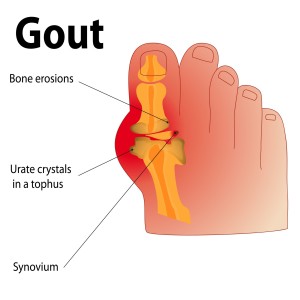Many people are unfamiliar with gout, but that may be changing as a new study by the Annals of the Rheumatoid Diseases suggests that the condition is on the rise in Western countries, including the United Kingdom. Unfortunately, because people are unfamiliar with gout, they may not see a doctor upon experiencing its symptoms. This delay in schedule gout treatment can lead to underreported rates.
 What is Gout?
What is Gout?
Gout is a type of inflammatory arthritis that affects joints across the body. In a healthy individual, uric acid is passed through the kidneys and eliminated from the body. In someone with gout, this acid builds up, causing urate crystals to form.
When this happens, a gout attack may occur, causing sharp pain and irritation. In most cases, gout will attack as a flare-up, meaning it comes and goes and attacks can last for a few weeks. The good news, however, is that many people with gout will either never have a serious attack or will only have a few over their lifetime.
What Causes Gout?
Because gout is caused by a build-up of uric acid that has not been eliminated by the kidneys, kidney dysfunction or disease doesn’t need to be ruled out as a primary cause. Another common cause of gout is excessive alcohol consumption.
This varies from person to person, but even a short period of time drinking excessively is enough to potentially cause gout. Another cause of gout is family history. Some people are more prone to develop gout if they have relatives who have had it. Additionally, medications can lead to gout in some people, and individuals who are dealing with hypertension and narrowing of the blood vessels are at a higher risk for developing gout, as well.
How is Gout Treated?
When dealing with an acute attack of gout, you should rest the affected joint to relieves pressure. Using an ice pack may reduce swelling, and over-the-counter anti-inflammatory medications may help, but always check with your physician before taking such medications. Lifestyle changes may also be in order if you are overweight, drinking to excess, or are facing other health concerns. In some cases, prescription medications may be required to control your gout attacks.
If you’re dealing with gout, or if you’re concerned about the possibility of developing gout, contact the Casteel Foot and Ankle Center in Rowlett, TX. Our physician offers you a variety of treatment options for patients dealing with gout as well as treatment solutions for heel pain, ankle pain, and other podiatric concerns.
Schedule Gout Treatment in Rowlett
To schedule your appointment with Dr. Catherine Casteel, call 972-412-4449.
